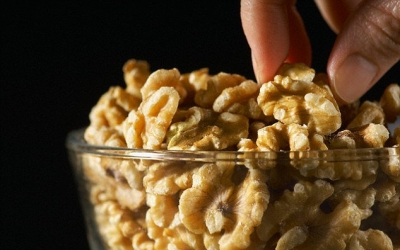- Latest news▼
-
15:11, April 24 Zombie deer disease possibly linked to hunters’ deaths

-
12:27, April 23 Appetite: Scientists found out the secret to the appeal of large portions of fast food

-
10:33, April 23 Scientists test new approach to fighting viruses

-
08:38, April 23 Ketamine may help with postpartum depression

-
22:12, April 22 Unhealthy amount of sugar found in baby food products of a well-known brand

-
19:41, April 22 Air pollution puts health of more than 1.6 billion workers globally at risk

-
17:25, April 22 Scientists found baked goods and lack of sleep to be more dangerous than alcohol

-
16:02, April 22 342 cases of measles recorded in Armenia so far in 2024

-
15:29, April 22 BrainStimulation: electrical brain stimulation alleviates anxiety and depression in the elderly

-
08:27, April 22 Cognitively stimulating jobs in midlife could lower dementia risk in old age, study finds

-
20:37, April 21 Environmental Health Perspectives: Microplastics ingested with food and water can spread from the gut to the brain

-
22:41, April 20 Scientists develop new method to safely stimulate immune cells to fight cancer

-
20:46, April 20 Blood test can determine who is at risk of developing multiple sclerosis - scientists

-
18:36, April 20 Next pandemic likely to be triggered by flu - scientists

-
12:16, April 19 Scientists grow human mini-lungs in lab

All materials
A daily handful of WALNUTS can slow the growth of bowel cancer

A handful of walnuts a day could help slow the growth of cancer tumours, according to a new study.
Omega-3 fatty acids and other compounds in the nuts may reduce inflammation in bowel cancer cells.
They also reduce blood supply to the tumour, significantly slowing down its growth.
US researchers found mice fed a diet high in walnuts had tumours containing ten times the amount of omega-3s than a control group.
Bowel cancer, also called colorectal cancer, is the third most common type of cancer worldwide and is the second leading cause of death in Western Countries, after lung cancer.
In Britain 41,581 people were diagnosed with bowel cancer in 2011 and in the following year 16,187 people died from the disease.
In the US, the American Cancer estimates that in 2015, there will be 132, 700 new cases of bowel cancer, and it will cause 49,700 deaths.
Research has shown that 30 – 50 per cent of bowel cancer in men, and 20 per cent in women can be prevented by changing to a healthier diet and lifestyle.
The study, carried Dr Christos Mantzoros, of Harvard Medical School, is the first of its kind to analyse the impact of walnuts on micro-ribonucleic acids (miRNA), which control how genes adapt to environmental factors.
Dr Mantzoros said: 'Our research demonstrates that a walnut diet causes significant changes in the expression profile of miRNAs in colorectal cancer tissue.'
Compounds in walnuts causes more protective omega-3 fatty acids to congregate in tumour cells, he continued.
While future studies are needed, he is 'optimistic' changing the expression of miRNAs have a role in targeting bowel cancer, he added.
Researchers fed a group of mice the equivalent of two servings (2ozs or around 57g) per day of walnuts for humans, while a second group received a similar control diet without walnuts.
After 25 days researchers found that in walnut-fed mice, key miRNA that may affect cancer cell inflammation, blood supply and proliferation were 'positively engaged'.
The tumors of mice fed the walnut-containing diet were found to have 10 times the amount of total omega-3 fatty acids compared to the mice fed the control diet.
This included the plant-based alpha-linolenic acid (ALA), a fatty acid critical to various body processes and known for its inflammation reducing properties.
The study, published in the Journal of Nutritional Biochemistry, found that the greater the amount of omega-3 acids, the smaller the tumour, suggesting that ALA may offer some protection.
Tumor growth rate was also significantly slower in the walnut group compared to the control group, but the scientists say that because the study was conducted on animals the results won't necessarily be the same for people.
Walnuts are the only nut that contain a significant source of ALA - 2.5 grams per ounce - as well as a variety of antioxidants, (3.7 mmol/ounce), and numerous vitamins and minerals.
Follow NEWS.am Medicine on Facebook and Twitter
- Video
- Event calendar
- Archive
- Most read
month
week
day
- JAMA Oncology: Urine test can help rule out high-grade prostate cancer with almost 100% accuracy, study shows 1253
- Daily Mail: Elderly woman in China gets infected with brain-eating amoeba 1194
- Obesity: exercising before breakfast helps you lose weight faster 1174
- Scientists grow human mini-lungs in lab 1143
- Next pandemic likely to be triggered by flu - scientists 881
- Scientists found baked goods and lack of sleep to be more dangerous than alcohol 791
- 342 cases of measles recorded in Armenia so far in 2024 750
- Blood test can determine who is at risk of developing multiple sclerosis - scientists 732
- Scientists develop new method to safely stimulate immune cells to fight cancer 730
- Cognitively stimulating jobs in midlife could lower dementia risk in old age, study finds 714
- BrainStimulation: electrical brain stimulation alleviates anxiety and depression in the elderly 660
- Air pollution puts health of more than 1.6 billion workers globally at risk 529
- Unhealthy amount of sugar found in baby food products of a well-known brand 524
- Ketamine may help with postpartum depression 512
- Appetite: Scientists found out the secret to the appeal of large portions of fast food 508
- Find us on Facebook
- Poll





